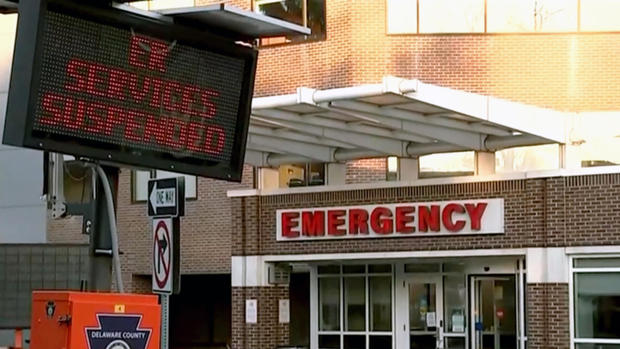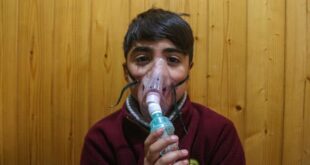After a car accident last month, Latifa Dixon, a mother of two, arrived at the emergency room at Delaware County Memorial Hospital in suburban Philadelphia only to learn the ER had just shut down. Twenty-eight-year-old Cecilia Vizuete, who was having trouble feeding her one-year-old daughter because of a breast infection, said she was told by a security guard to search Google Maps for another hospital. Shirley Posey arrived there suffering from shortness of breath and tightness in her chest.
“This was the closest hospital to me and I needed help,” Posey said when CBS News met her outside Delaware County Memorial. Posey later recovered, but not until she raced to an urgent care, collapsed, and was transported by ambulance to another hospital.
For nearly a century, Delaware County Memorial delivered babies, treated trauma and tended to the critically ill. That all changed earlier this year, when its current owners, a Los Angeles-based for-profit company called Prospect Medical Holdings, began cutting services at the 168-bed hospital in Upper Darby, Pennsylvania. First the maternity ward went, then the operating rooms and the I.C.U., and then, last month, the emergency department closed its doors to the community’s nearly 85,000 residents.
The shutdown has raised questions about the role of private equity as it piles into the health care space, snapping up everything from local doctors’ practices to specialty clinics, even hospices. According to the consultancy Bain & Company, private equity firms posted a record year for deal volume in health care in 2021, with the total value of those deals topping $150 billion.
Backed by private equity investment, Prospect Medical Holdings rapidly grew to own 20 hospitals in six states by 2018. In 2016, it bought Crozer Health, a nonprofit Pennsylvania health system that was in danger of failing.
A CBS News investigation found that of those 20 hospitals owned by Prospect Medical, five have closed. In addition to Delaware County Memorial, Prospect Medical has suspended all services at Springfield, another acute care hospital in the same Pennsylvania health system. It also closed three hospitals in a San Antonio health system it purchased in 2012.
In court proceedings, Prospect Medical argues it is not seeking to close Delaware County Memorial for good. In a statement to CBS News, the company said it is working to transition the hospital to a “100 patient facility for those in need of behavioral health and other services.” As part of the plan, the hospital will lose inpatient “acute care services,” which includes the lone emergency room in the community of Upper Darby.
“There aren’t resources nearby and so we find that people wait longer to go to the hospital,” county official Monica Taylor told CBS News chief medical correspondent Dr. Jon LaPook, adding that closing what’s considered a safety-net hospital will hit the area’s low-income population hardest.
“We wouldn’t see a hospital closing down if this were a more affluent area,” said Taylor. “It leaves a gaping hole in this community that is going to be very hard and very difficult to fill.”
“What they cared about was making money”
In a presentation provided to Delaware County officials, Prospect Medical cited struggles with high labor costs, record inflation for supplies and pharmaceuticals, and the strain of the COVID-19 pandemic for its decision. Taylor said she believes the company has not been upfront, and has been reluctant to share its financials with the county.
“I had the sense they were not giving us all the information,” Taylor said.
Prospect Medical has faced scrutiny before. In 2019, Rhode Island Attorney General Peter Neronha’s office investigated a proposed company transaction. Prospect Medical owns two hospitals in the state, that Neronha said were “in real danger of closing” because of the debt Prospect Medical had taken on.
“This had nothing to do with the pandemic,” Neronha told CBS News. “Hospitals all over the country were facing the pandemic … but the problems here were exacerbated, frankly, by greed.”
Neronha invoked state law to force Prospect Medical to turn over its finances. A ruling by the attorney general’s office found the company put “every hospital in its system…at risk of reduction of services, sale or closure.”
“They didn’t care about health care,” Neronha said. “What they cared about was making money for their investors.”
Neronha hired two different outside experts to follow the money and discovered one reason why Prospect Medical was experiencing financial strain. In 2018, company owners took out a $1.12 billion loan, using proceeds to pay themselves and their private equity shareholders a $457 million dividend, according to the company’s financial statements, obtained by Neronha’s office in the course of the investigation.
“It’d be like a homeowner going to a bank, taking out a $100,000 loan, and instead of using it to invest in their property or pay for their kids to go to college, what they did was they just basically stuck it in their pockets as cash,” Neronha told CBS News.
The company’s financial statements revealed that to pay back that $1.12 billion loan, Prospect Medical sold the land and the buildings from hospitals they owned in California, Connecticut and Pennsylvania to a real estate investment trust for $1.386 billion. The documents show Prospect Medical then leased those hospitals back from the real estate investment trust.
“So now you’re even in a worse position because you have no equity any longer,” Neronha said. “You don’t own anything that you can then go to the bank and use as collateral to raise more money when you need it.”
In Delaware County, that lease-back arrangement instead meant the health system was saddled with $35 million a year in rent.
CBS News
CBS News submitted detailed questions to Prospect Medical about these financial decisions, including about the $457 million dividend and the lease-back arrangement. The company, through a spokesman, declined to answer those questions.
“They are drawing the value out of these hospitals as they would money from a piggy bank,” said Eileen O’Grady, campaign director with the Private Equity Stakeholder Project, a nonprofit organization that has raised concerns about Prospect Medical to attorneys general in the six states where the company owned hospitals. “Meanwhile, the company’s owners have made out like bandits.”
Neronha’s office confirmed to CBS News that the Prospect Medical CEO’s personal share of the $457 million dividend was about $90 million.
“What they’ve done is extremely evil”
One of the early investors in Prospect Medical’s 2016 purchase of the Pennsylvania health system told CBS News that the company entered into the arrangement as the only bidder and “last hope for these failing hospitals.” When the purchase was announced, local officials said it came with a promise: to invest $200 million to “dramatically increase…service to the community.”
“They tried to tell us that they were going to run us the same way,” said emergency nurse Angela Neopolitano, who worked at Delaware County Memorial for 41 years. Instead Neopolitano, who was president of the local nurses’ union, says Prospect Medical dismantled the hospital piece by piece, leading to longer waits in the emergency room and forcing staff to transfer more patients to other hospitals.
“They kept on cutting services,” Neopolitano said. “Things wouldn’t get fixed. Our elevator in the back of the emergency room had been broken for over a year. When they closed the I.C.U., that was the knife in my heart.”
Neopolitano said at one point, the credit cards used by paramedics within the health system to fill their ambulances with fuel were disabled because Prospect Medical “didn’t pay their bill.”
The company did not respond to questions about its specific investments at Delaware County Memorial, but in an annual report said it had lived up to its commitment to invest $200 million in Crozer Health.
The company did not respond to a question about whether it neglected to pay fuel bills for ambulances, which was first reported in an investigation of the company by ProPublica. The company told ProPublica a company credit card was rejected because it had a charge limit as a security measure, and it increased the limit when it was brought to their attention to ensure there was not a disruption of services.
Now, the company has pivoted to a plan to convert Delaware County Memorial into a behavioral health facility. An executive with the hospital told the Philadelphia Inquirer last week that the new incarnation would not be “a moneymaker… but we go from losing $18 million a year to making $3 million and providing needed services to the community.”
The shut down of Delaware County Memorial in September has sparked a legal battle which has drawn in Pennsylvania’s attorney general and governor-elect Josh Shapiro.
In October, a judge granted an emergency injunction to keep the hospital open. Yet weeks later, the state’s health department shut it down anyway, after Prospect Medical notified the department of staffing issues.
In a statement to CBS News, Prospect Medical said the ongoing litigation limits what it can say, but that the company is communicating with state health officials about its “multiple efforts to address those staffing issues.” The company has pledged to save the facility by turning it into a “desperately needed 100-patient facility for those in need of behavioral health and other services.”
Next week, a judge will hear arguments over whether to require Prospect Medical to find a way to re-open the hospital’s doors. Shapiro’s office has asked the judge to hold Prospect Medical in contempt and to fine it $100,000 for every day it does not resolve the staffing issues.
Neopolitano told CBS News she thinks that the $457 million dividend Prospect Medical’s owners and private equity investors paid themselves should have gone back into the hospitals and into the community.
“What they’ve done is extremely evil, in my words,” said Neopolitano of Prospect Medical. “To gain a dollar, you maybe destroyed lives, maybe even ended lives, because they can’t get the help they need.”

 Latest Breaking News Online News Portal
Latest Breaking News Online News Portal






